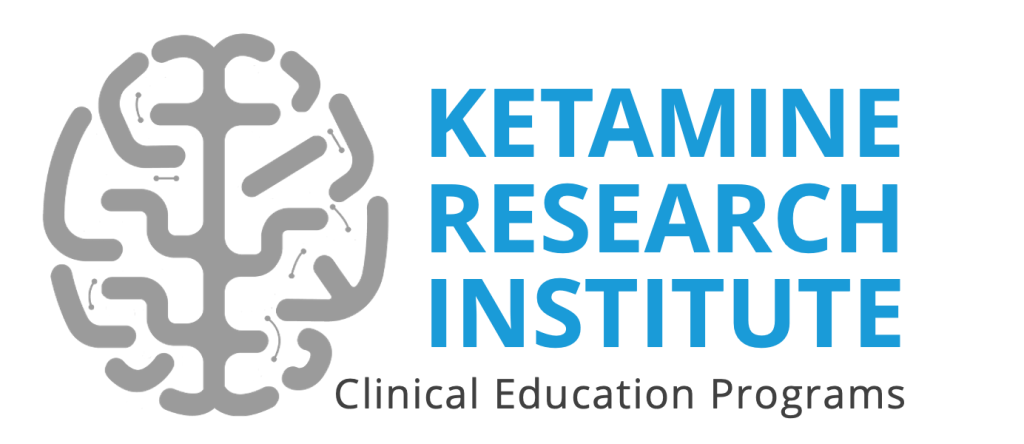
Ketamine Research Institute Training Program
The "Mini-Fellowship" Intensive Ketamine Infusion Training for Clinicians — Compliance with APA, ASA and DEA Recommendations
How The Ketamine Research Institute Training Program
Complies with APA and ASA Recommendations
Ketamine is a potentially effective treatment for mood disorders, including major depressive disorder (MDD). However, its long-term effects and potential for abuse are not fully understood, which makes its use in treating mood disorders controversial. Thus, comprehensive training for clinicians administering ketamine for MDD and other mood disorder treatments is crucial. To ensure safe and effective care, the American Psychiatric Association (APA) and the American Society of Anesthesiologists (ASA) have provided guidelines on clinician training in ketamine therapy, emphasizing the importance of proper training, ongoing education, a collaboration between healthcare providers.
 APA and ASA Recommendations
APA and ASA Recommendations
The American Psychiatric Association (APA) and the American Society of Anesthesiologists (ASA) have released recommendations on clinician training in ketamine therapy. These guidelines provide a framework for understanding the potential benefits and risks associated with ketamine and best practices for administering it safely. With these resources, professionals can ensure that they provide quality care while minimizing potential harm from its use.
The recommendations outline the importance of proper training for didactic and supervised clinical experience to ensure clinicians provide safe and effective care. The guidelines also emphasize the need for ongoing education and collaboration between healthcare providers. Additionally, they recommend that all providers involved in administering ketamine therapy should be knowledgeable about its pharmacology, potential side effects, and contraindications.
The recommendations also emphasize the need for appropriate patient selection and review of the patient's medical and mental health records before consideration of ketamine-based therapy. Finally, it outlines the need for informed consent, alternative treatment options, and ongoing patient follow-up and monitoring to assess the long-term safety and efficacy of ketamine treatment for mood disorders. Finally, they outline the need for informed consent and other ethical considerations.
There Are No "Formally" Approved Training Programs in Ketamine Therapy
However, it is important to note that neither the APA nor the American Society of Anesthesiologists (ASA) currently provide or offer comprehensive training programs in ketamine infusion therapy (KIT) for clinicians. Furthermore, they do not approve or accredit any specific training programs. This leaves a significant gap in standardized training for clinicians interested in providing this potentially life-altering treatment to their patients.
The absence of a national certification process recognized by organizations like the ACGME, combined with the lack of specific training programs provided or approved by the APA and ASA, points to the need for high-quality, comprehensive training programs.
The guidelines provided by the APA and ASA are only recommendations. Clinicians should consult with their local governing bodies and state medical boards for specific rules and regulations regarding ketamine therapy in their area. Additionally, it is essential to review any additional literature on ketamine that may provide further insight into its use. By following these guidelines and taking the time to understand the potential risks and benefits, clinicians can provide safe and effective care for those suffering from mental health disorders.
The Ketamine Research Institute Training Program
The Ketamine Research Institute training program - "Mini-Fellowship" Intensive Ketamine Infusion Training for Clinicians, strives to meet or exceed all APA and ASA recommendations. Our intensive education course systematically reviews every essential aspect of ketamine therapy while ensuring compliance with APA and ASA standards.
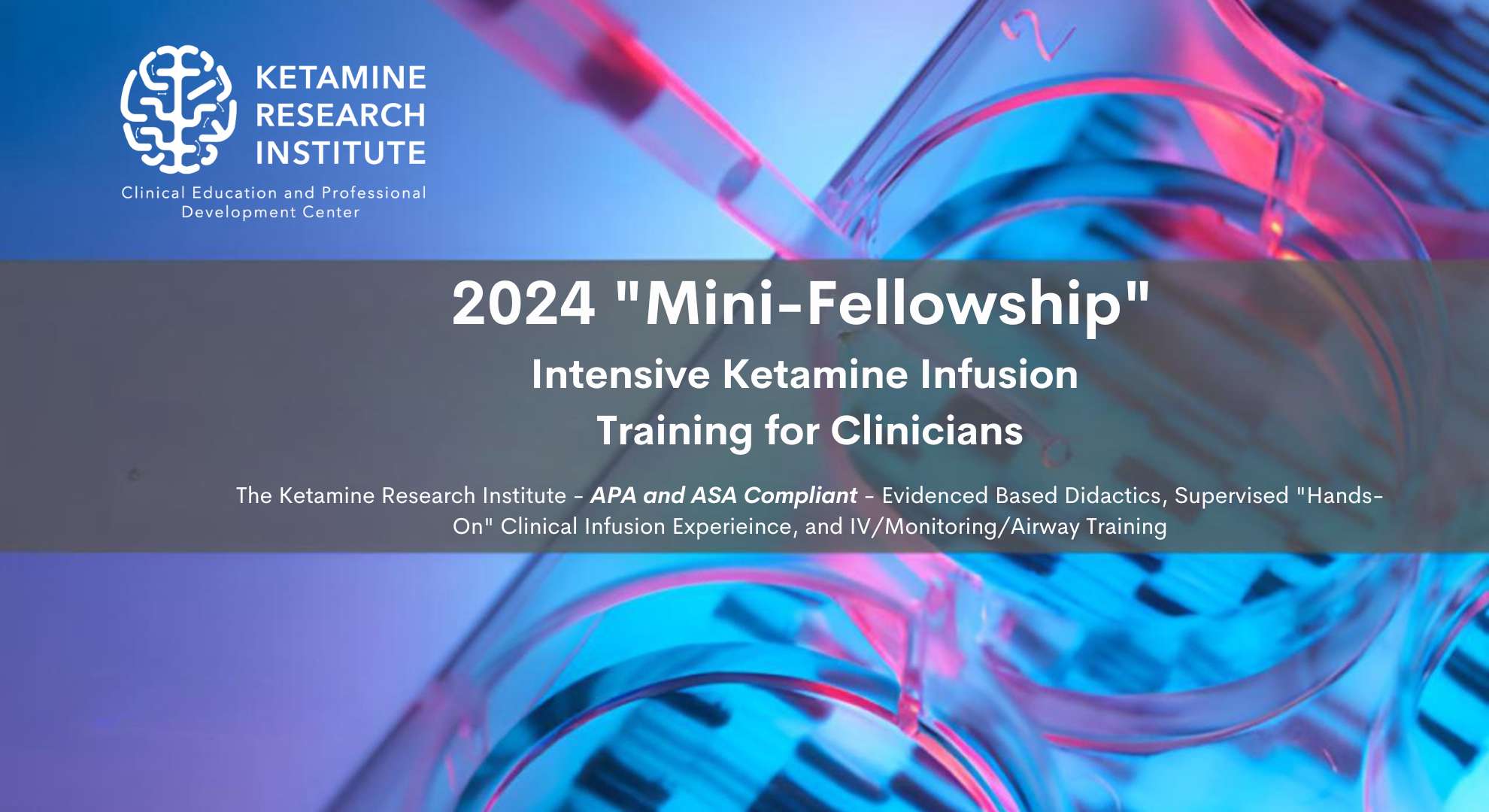
The Curriculum and Learning Environment
The course is conducted in person and in an actual infusion center environment to facilitate learning and clinical experience. It includes comprehensive evidenced-based didactic lectures, case studies, and hands-on training to ensure clinicians are adequately prepared to administer ketamine safely and effectively—the hands-on training includes simulated scenarios to allow for practice in a controlled environment. This will enable clinicians to learn proper techniques for administering ketamine infusions safely and effectively.
Patient Selection, Dosing, and Administration
The curriculum covers the appropriate patient selection, dosing, and administration of ketamine, as well as the necessary patient monitoring and safety measures that should be taken during and after treatment, following APA and ASA recommendations.
At the core of any successful ketamine therapy program are rigorous patient selection techniques designed to select the best candidate for ketamine therapy and exclude those who may be unsuitable for treatment. Careful evaluation of a patient's psychiatric history, medical history, current medications, and metabolic profile provides valuable information to the ketamine clinician. This helps ensure that ketamine therapy is offered effectively with minimal risk to the patient.
In addition to careful selection, ketamine providers must be mindful of the patient's mood disorder diagnosis when developing an individualized ketamine therapy plan. Our training program emphasizes the importance of individualized treatment plans for each patient and the need for ongoing evaluation of treatment efficacy and potential adverse effects. Additionally, it stresses the importance of ethical considerations and the need for informed consent from patients considering ketamine treatment.
Below is a brief example of topics covered in the course related to APA recommendations.
Alignment with APA Guidelines:
The Ketamine Research Institute training program has been carefully designed to align with the 2017 APA Consensus Statement on the Use of Ketamine in the Treatment of Mood Disorders. The program covers essential topics and provides practical experiences in each of the following key areas outlined by the APA:
Patient Selection: The training program teaches clinicians how to properly assess and select patients for ketamine therapy based on indications, contraindications, and potential risks. This includes understanding the appropriate use of ketamine in the treatment of mood disorders, such as treatment-resistant depression, and identifying patients who might benefit the most from this therapy.
Clinician Experience and Training: The program ensures that clinicians receive comprehensive education and hands-on training in ketamine therapy, including its pharmacology, administration, and management of potential side effects. Supervised clinical training with experienced professionals allows participants to develop the necessary skills and expertise to provide safe and effective ketamine treatment for mood disorders.
Treatment Setting: The training emphasizes the importance of providing ketamine therapy in a controlled and comfortable environment, equipped with necessary monitoring and emergency equipment. Clinicians are taught to ensure that patients feel secure and well-supported during treatment sessions and that their privacy and dignity are maintained.
Medication Delivery: Dose, Delivery Procedure: The program covers the appropriate dosing and delivery methods for ketamine therapy, including intravenous, intramuscular, subcutaneous, and intranasal routes. Clinicians are trained to administer the medication safely, titrate the dose based on patient response, and manage any potential complications or side effects.
Follow-Up and Assessments: The training program highlights the importance of regular follow-up and assessments to evaluate the efficacy and safety of ketamine treatment in patients with mood disorders. Clinicians are taught to monitor patients' progress, adjust treatment plans as needed, and provide appropriate support and referrals for adjunctive care.
Efficacy of Longer-Term Repeated Administration: The program addresses the evidence supporting the efficacy of repeated ketamine administration for maintaining treatment response in mood disorders. Clinicians are educated on the benefits, risks, and practical considerations of longer-term ketamine treatment, and how to balance these factors for optimal patient care.
Safety Measures and Continuation of Treatment: The training emphasizes the importance of implementing safety measures throughout the ketamine treatment process, including proper patient selection, medication delivery, and monitoring. Clinicians are taught to recognize and manage potential adverse events and to determine when it is appropriate to discontinue treatment or refer patients for alternative therapies.
By following these guideline, the Ketamine Research Institute training program is designed to comprehensively address the key areas outlined in the 2017 APA Consensus Statement on the Use of Ketamine in the Treatment of Mood Disorders. The program ensures that clinicians are well-equipped with the knowledge, skills, and experience necessary to provide safe and effective ketamine therapy for patients with mood disorders.
Supervised Clinical Infusion Experience
Although evidence-based didactics are essential for providing safe and effective treatments with ketamine infusion therapy, the best way to gain experience is through supervised clinical practice. To properly understand the complexities behind providing ketamine infusions, our program provides trainees with supervised clinical infusion experience in our infusion center.
This "hands-on" training component also complies with APA recommendations. It allows clinicians to have a better understanding of the ketamine infusion process from the perspective of the American Society of Anesthesiologists concerning the administration of sedation by non-anesthesiologists. Additionally, supervised clinical infusion experience allows clinicians to build confidence in their skills, practice communication with patients, and secure a better understanding of the risks associated with ketamine therapy.
Adherence to ASA Guidelines:
Ketamine, originally introduced as an anesthetic agent, has found new applications in the treatment of various mental health conditions, including depression and PTSD. As such, its administration has extended beyond the domain of anesthesiologists to include psychiatrists, psychologists, and other mental health professionals in private practice settings.
However, the fact remains that ketamine is a powerful medication with significant physiological effects, which can include alterations in consciousness, blood pressure, and heart rate, among others. As such, it's important that all practitioners who administer ketamine, regardless of their primary specialty, understand its pharmacokinetic and pharmacodynamic properties. They should also be familiar with the potential side effects and know how to monitor and manage them effectively.
The American Society of Anesthesiologists (ASA) has established a set of guidelines for the administration of sedation and analgesia by non-anesthesiologists. These guidelines emphasize the importance of patient safety, appropriate patient monitoring, and emergency preparedness. They also recommend that non-anesthesiologist practitioners have specific training and experience in the use of sedative and anesthetic drugs, as well as in airway management and resuscitation.
Therefore, clinicians in private practice who administer ketamine should ensure that they comply with these guidelines, as this will help them to provide the safest and most effective treatment for their patients.
The Ketamine Research Institute's training program is designed to provide this necessary education and practical experience, ensuring that clinicians can administer ketamine safely and effectively, in accordance with the recommendations of the ASA to ensure our clinicians can deliver the highest level of care, The program meets or exceeds all of the following ASA recommendations:
Practice Guidelines for Sedation and Analgesia by Non-Anesthesiologists: The training program covers the principles of sedation and analgesia, patient assessment, monitoring, and management of complications, including a thorough understanding of the pharmacology of ketamine.
Basic Standards for Preanesthesia Care: The program emphasizes the importance of preanesthesia evaluation, informed consent, and patient preparation, including identifying and addressing any potential risks.
Standards for Basic Anesthetic Monitoring: The training covers essential monitoring standards, such as continuous pulse oximetry, noninvasive blood pressure, electrocardiography, and capnography, ensuring clinicians can recognize and respond to any deviations.
Distinguishing Monitored Anesthesia Care (MAC) from Moderate Sedation/Analgesia:
The program teaches the differences between MAC and moderate sedation/analgesia, including indications, appropriate monitoring, and the level of provider involvement.
Statement on Documentation of Anesthesia Care: Clinicians are instructed on proper documentation of anesthesia care, promoting accurate record-keeping and facilitating communication among providers.
Statement of Granting Privileges for Administration of Moderate Sedation to Practitioners: The training program ensures clinicians have demonstrated competency in the administration of moderate sedation, including ketamine, through theoretical knowledge and hands-on clinical experience.
Statement on Intravenous (IV) Fluids: The program covers proper techniques for spiking IV fluid bags, including aseptic technique and label verification, to minimize the risk of infection and medication errors.
Statement on Recommendations for Safe Injection Practices: The training emphasizes the importance of safe injection practices, such as using single-dose vials, proper needle and syringe handling, and aseptic technique, to minimize the risk of infection and cross-contamination.
Continuum of Depth of Sedation: Definition of General Anesthesia and Levels of Sedation/Analgesia: The program educates clinicians on the continuum of sedation depth, enabling them to recognize the different levels of sedation, tailor their approach, and respond appropriately to changes in the patient's level of consciousness.
Beyond complying with the guidelines set forth by the American Psychiatric Association (APA) and the American Society of Anesthesiologists (ASA), it is crucial to remember that ketamine is classified as a Schedule III controlled substance under the U.S. Controlled Substances Act. This means that its usage and administration are regulated by the Drug Enforcement Administration (DEA), and specific requirements must be met to ensure legal and ethical practice.
Compliance with DEA Guidelines
Compliance with the guidelines set forth by the Drug Enforcement Administration (DEA) is of paramount importance in our training program at the Ketamine Research Institute. As ketamine is classified as a Schedule III controlled substance it's crucial that all clinicians participating in our program understand and strictly adhere to the regulations pertaining to its use.
Our training begins with an in-depth explanation of the DEA's classification of ketamine, as well as its legal implications. We discuss the potential penalties for non-compliance, which can include fines, imprisonment, and loss of license to practice. This helps underline the gravity of the responsibility that comes with handling ketamine.
We then move on to practical training on how to correctly store and handle ketamine. This includes comprehensive guidelines on safe storage practices, such as maintaining proper temperatures, ensuring secure containment, and limiting access to authorized personnel only. Trainees are also taught how to handle ketamine safely to prevent accidental exposure, and are given guidelines on appropriate disposal methods for unused or expired ketamine.
Record-keeping is another key component of DEA compliance. Our trainees are taught how to maintain accurate, up-to-date records of all ketamine transactions, including quantities received, used, and discarded. They are also instructed on how to accurately document each patient's ketamine use, which is crucial not only for legal compliance, but also for monitoring patient responses and adjusting treatment plans accordingly.
Surpassing Standard Recommendations
In addition to aligning with the guidelines set forth by these esteemed organizations, our program goes beyond their recommendations by offering unique learning experiences and resources to our trainees. One such opportunity we provide is for clinicians to personally experience a ketamine infusion. This immersive experience allows participants to better understand the patient perspective, which in turn will enable them to more effectively select candidates and design individualized treatment plans.
We also incorporate more sophisticated methods of providing safe, effective, and consistent ketamine therapy by employing basic, clinically relevant pharmacokinetic modeling. This approach enhances our clinicians' understanding of ketamine's actions within the body, allowing them to make well-informed decisions about dosing and administration.
Our training program further extends beyond the APA and ASA recommendations by addressing drug-drug interactions and genetic factors that may affect ketamine efficacy. This knowledge helps our clinicians to better tailor treatment plans for each patient and minimize the risk of adverse events.
Lastly, we understand the importance of ongoing support and mentoring for the professional development of our trainees. To this end, we offer personal ongoing clinical and professional mentoring to ensure that our graduates continue to excel in their practice of ketamine therapy.
We are committed to providing our clinicians with a comprehensive and enriching learning experience, equipping them with the necessary skills and knowledge to excel in the field of ketamine therapy for mood disorders.
Conclusion
In summary, our training program goes above and beyond the expectations of leading professional organizations, ensuring our clinicians are equipped with the necessary skills and knowledge to excel in the field of ketamine therapy for mood disorders.
The program emphasizes the importance of a multidisciplinary approach to ketamine treatment, including collaboration with other healthcare providers such as psychiatrists, psychologists, and primary care physicians. It also provides continuing education and professional development opportunities to ensure clinicians stay up-to-date on the latest research and best practices related to ketamine treatment for mood disorders.
Upon completing the course, clinicians will have the necessary knowledge and skills to provide safe and effective ketamine treatment to patients with MDD who have not responded to other therapies. This includes a comprehensive understanding of the ethical considerations of ketamine for mood disorders and the importance of ongoing evaluation and monitoring of treatment efficacy and potential adverse effects.
This comprehensive and immersive educational experience will allow our course participants to successfully incorporate the ketamine treatment into their practice and provide safe, effective, and ethical care to their patients.

To Learn More About Our Programs - please click the links below:
The "Mini-Fellowship" Intensive Training Program
A Detailed Course Overview
Day 1: Ketamine-Based Therapy: The Current State of Ketamine Therapy
Day 2: Ketamine-Based Therapy: Efficacy versus Effectiveness
Day 3: Ketamine-Based Therapy: The Precision Medicine Approach
Our 2023 Course Schedule and How To Apply For Training
New Courses Beginning in 2024
Ketamine Training for Experienced Providers and Anesthesiologists
Improving Ketamine-Assisted Psychotherapy with Precision Medicine
and Target-Controlled Administration Techniques
The Origin of Our Ketamine Training Program
What Our Graduates Say About The Course
"Mini-Fellowship" Intensive Ketamine Infusion Training for Clinicians
3-Day Intensive Course
Our course not only covers all of the practical aspects of ketamine therapy but expands into scientific principles allowing optimization of the basic protocol. All course training is conducted “on-site” in an actual infusion center so that you will have an opportunity to become familiar with the environment in which infusions are performed and obtain valuable clinical experience administering ketamine infusions under expert supervision. This includes utilizing all of the necessary monitoring equipment, intravenous delivery systems, and supplies necessary for the safe administration, storage, and handling of ketamine.
How to effectively integrate ketamine therapy into your current practice
_________________
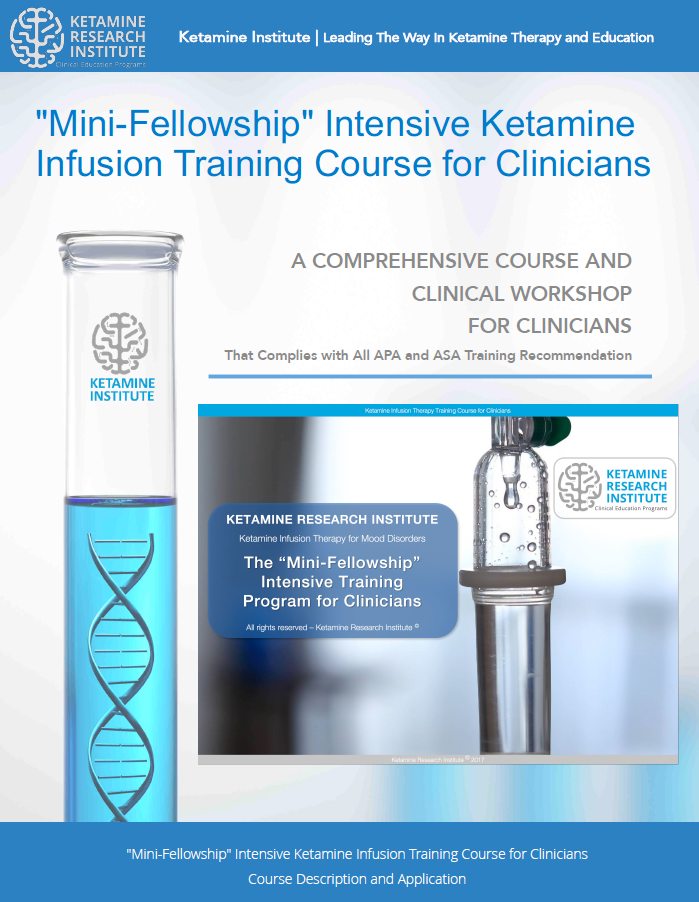
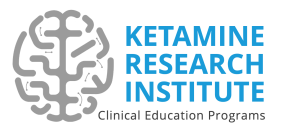
The Ketamine Institute
The Ketamine Institute is leading the way in the field of ketamine infusion therapy and physician education with our new ketamine infusion training program. We’re on a mission to accelerate the health care revolution. We have pioneered ketamine infusion therapy to bring the latest breakthrough discoveries about ketamine out of the research lab and into our infusion centers.
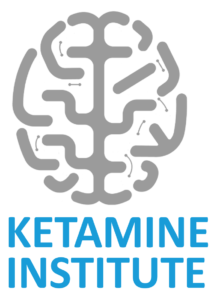

 APA and ASA Recommendations
APA and ASA Recommendations